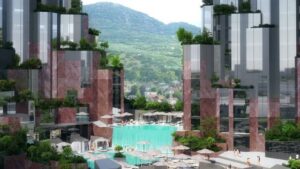Here’s something from the travel journalism phrasebook: the more a destination is referred to as a totally different place, the more of a holiday hotspot it’s becoming. Case in point? The New Croatia, the Maldives of Europe, the Caribbean of Europe, the Next Greece – also known as Albania – is enjoying a mega tourism boost right now.
Even if you haven’t actually been to Albania recently, you’ve probably seen the sights online. For us scrollers, The Land of The Eagle has been spread across our feeds recently; everyone, it seems, has been sunbathing on its sandy beaches, dipping into its pristine waters and dancing at its festivals.
Like hungover tourists in the hotel lobby come Sunday morning, statistically, this just about checks out. From 2010 to 2019, the number of tourists heading to Albania each year tripled to a peak of 3.3 million, with a hefty 120,000 of these international visitors coming from the UK; many, though, predict that figure will soon be in the millions.
It’s not always been like this. For decades, Albania all-but banned, well, everyone. The most isolated country in Eastern Europe, the Balkan nation didn’t open its doors until the late ‘80s, existing as a communist state closed-off to the rest of the world. When its Stalinist leader Enver Hoxha died in 1985, tourists started to trickle in, but it was hardly speedy boarding – by 1989 only 10,000 people across the globe were heading to Albania each year. To put that it into perspective, more people cram into Ally Pally every single Friday night.
Arrivals began to stack up in the late nineties and early noughties, when the European tourism industry started to catch on to Albania’s potential to compete in the Mediterranean’s ongoing Sunbed Wars. Although the country still faced power cuts, undrinkable water and sewage issues, by 2003, the government’s ministry of tourism was bulldozing buildings to beautify beaches and rebrand the nation; seven years later, it was Lonely Planet’s best place to visit.

Even as late as 2017, though, there was just one single, spenny British Airways journey from Gatwick to Tirana. Now, there are over ten routes; the cheapest comes courtesy of low-flying budget airline WizzAir, getting you there in three hours for just £27 each way – that’s £2 per 100 miles. “We have seen significant growth in the number of passengers choosing Albania as their holiday destination,” Zsuzsa Trubek, Wizz Air Corporate Communications Manager, tells THE FACE. “Passenger numbers are up 27 per cent for the first half of the year in 2023, compared to the same period in 2022.” To meet demand, they’ve increased capacity to run 19 flights per week.
Of course, Albania is still a relatively alternative destination. Fewer than 20 flights per week isn’t exactly a huge operation, and the number of Brits heading to Greece each year is almost 40 times higher. But there’s real belief that this is going to keep taking off, a steely confidence that’s led to the likes of RyanAir getting on board, investment from across the globe and an under-construction $125m airport in Albania’s old capital, Vlora, to be opened by April 2024.
Plus, considering that barely anyone outside of Albania knew anything at all about the country until twenty-or-so years ago, its ascent is dizzying. And this new interest is partly down to an almost universally-disliked tourist: the young Brit abroad.
See, while Amsterdam is weeding out UK stoners, Italians are growing increasingly tired of us and Lanzarote is lamenting our bad behaviour, Albania is welcoming us with open arms, promising the full, all-inclusive package: sun, sexy beaches and auspicious parties, plus (Londoners look away) a pint of good beer for 200 Lek: that’s just £1.50.
For many, the main attraction is its festivals, all of which are worth raving about. Kala, a boutique festival launched in 2018 by Mainstage Festivals and set on the Albanian Riviera, has quickly won the hearts of punters and made them ache for days after, a paradise of deep house and sun-dappled beaches. Mainstage also runs ION, a seven-dayer set in the same location that mixes music and wellbeing, and there’s another week-long, all-nighter further up the coast courtesy of UNUM.







